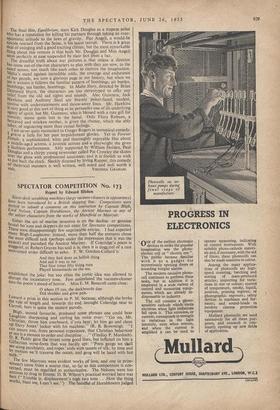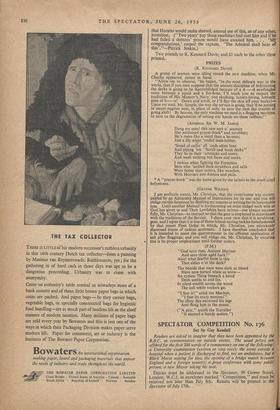SPECTATOR COMPETITION No. 173
Report by Edward Blishen
Silent deck-scrubbing machines (large vacuum-cleaners in appearance) have been introduced by a British shipping line. Competitors were invited to submit a comment on this innovation by Captain Bligh, Lord Nelson, Captain Hornblower, the Ancient Mariner or any of the saltier characters from the works of Masefield or Marryat.
. Either the art of marine invective is on the decline or genuine brutal bo'suns and skippers do not enter for Spectator competitions. There were disappointingly few unprintable entries. I had expected many Bligh-Laughtons: instead, more than half the entrants chose the most difficult task (perhaps under the impression that it was the easiest) and parodied the Ancient Mariner. If Coleridge's poem is doggerel, as Robert Graves has said it is, then it is doggerel of a rare unstrained order difficult to echo. F. W. Gordon-Collard's:
And they had done an hellish thing And sad it was to me That four times fifty living men Played housemaids on the sea.
established the joke: but too often the comic idea was allowed to
disrupt the incantatory tone. Few assimilated the vacuum-cleaner Into the poem's mood of horror. Miss E. M. Bancroft came close:
0 where IT ran, the deckboards dun
Did shudder and grow pale.
award a prize in this section to P. M. because, although she broke the rule of length and towards the end brought Coleridge near to Carroll, hers is quite the neatest parody.
Thigh, second favourite, produced some phrases one could hear Laughton sharpening and curling his voice over: "Go on, Mr. Christian, throw him overboard, d'yon hear; let him go and clean up Davy Jones' locker with his machine." (R. B. Browning). "I can assure you, from personal experience, that Christian behaviour at sea is a menace to order and discipline .. ." (Findlay P. Murdoch). Peddy gave the tyrant some good lines, but inflicted on him a Gilbertian verse-form that was hardly apt: "Press gangs we shall see using psychiatry, and ropes' ends with tassels of silk; by time and by motion we'll traverse the ocean, and grog will be laced with hot milk."
The few Marryats were evident works of love, and one (a prize- Winner) came from a source that, so far as this competition is con- cerned, must be regarded as authoritative. The Nelsons were too anxious to drag in Emma: D. B. Wilson's practical worried hero was
• best ("Trouble is, displacement's nigh two tons . . .How the thing works, blast me, I can't see.") The handful of Hornblowers judged . that Horatio would make shrewd, amoral use of this, as of any others invention. ("Two years' pay those machines had cost him and Wile had failed a debtors' prison would have awaited him. . . . 'KY congratulations,' rasped the captain. 'The Admiral shall hear of this '."—Patrick Jenkin.) Two pounds to R. Kennard Davis; and L1 each to the other three printed.
PRIZES (R. KENNARD DAVIS)
A group of seamen were idling round the new machine, when Mr. Chucks appeared, rattan in hand.
"Allow me to observe, "he began, "in the most delicate way in the world, that if you men suppose that the ancient discipline of holystoning the decks is going to be disestablished because of a d—d newfangled cross between a squid and a fire-hose, I'll teach you to respect the traditions of His Majesty's Navy, you skulking, luxury-loving, lubberlY sons of b—s! Down and scrub, or I'll flay the skin off your backs Upon my soul, Mr. Simple, the way the service is going, they'll be putting in steam engines next, in place of sails, to save the men the trouble of going aloft! By heaven, the only machine we need is a flogging machine, to save us the degradation of soiling our hands on these ruffians!"
(ADMIRAL SIR W. M. JAMES)
Dang my eyes! this new sort o' seaman Has jettisoned prayer-book* and scrubber; He's more like a maid than a he-man; Just a lily white 'anded land-lubber.
'Stead of callin' all 'ands afore four And piping 'em "Scrub and wash decks" They lie in their 'ammicks and snore, And wash nothing but faces and necks.
I reckun when fighting the Frenchies -
Men who 'andled deck-scrubbers and sails Were better than sailors, like wenches, With Hoovers and dusters and pails.
* A "prayer-book" was the name given by the sailors to the small-sized holystones.
(GRAEME WILSON)
I am perfectly aware, Mr. Christian, that the contrivance was accom• panted by an Admiralty Manual of Instructions for its use: and you will oblige me this forenoon by drafting my reasons in writing for its lamentable loss. Until another Manual is forthcoming we must cudgel such wits as God has given us and Their Lordships have striven—not always success- My, Mr. Christian—to instruct, so that the gear is employed in accordance with the traditions of the Service. I share your view that it is scrubbing- gear, and I agree that it is one of those labour-saving tackles foreshadowed by that recent Fleet Order in which, Mr. Christian, you mistakenly discerned traces of radical sentiment. I have therefore concluded that it is intended to assist the quartermaster in the efficient application of salt after floggings; and you will oblige me, Mr. Christian, by ensuring this is its proper employment until further orders.
(P.M.) "God save thee, Ancient Mariner And save thine aged back!" Alas! what fearful form is this That sidles o'er the deck?
The boards that once were dark as blood
Have now turned white as snow—
An eyeless Thing beneath a hood Doth amble to and fro.
In silent-stealth across the wood The soft white suckers go.
"I fear it!" cried the Mariner, "I fear its crazy motion!" The slimy flex entwined his legs And flung him in the ocean.
("A pity," quoth the Traveller "It seemed a handy notion.")



































 Previous page
Previous page